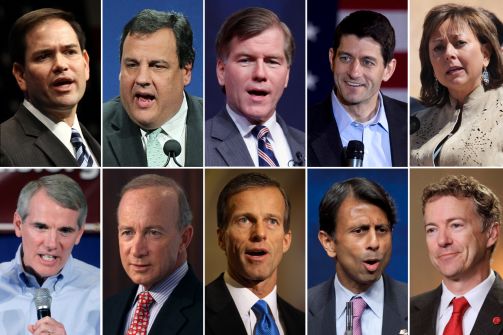Mitt Romney's Vice Presidential Selection: Finding A Balance

The hardest part for a candidate when selecting their vice presidential candidate is finding the right balance. You want to select someone who adds new demographics of supporters and increases your odds of winning the general election without overshadowing yourself. The nominee doesn't want to select a candidate who is not noteworthy enough to make a difference (think William E. Miller in 1964), different or controversial enough to cause a loss of focus on the candidate's platform (think Sarah Palin in 2008), controlling enough to affect the candidate's superiority as president once they take office (think John C. Calhoun from 1824-1828), or someone with a dangerous personal agenda that could come out later once in power (think Aaron Burr in 1800). Finding that perfect running mate is often a very difficult feat to accomplish. Mitt Romney would know, he's facing this challenge right now.
You would think someone like Romney would be easy to balance off. His only political work was being governor of Massachusetts from 2003-2007 and is better know as a businessman. Romney is also lacking a compelling and powerful personality when it comes to public speaking and debating. So, for balance reasons his running mate selection should be a veteran politician with multiple terms of experience and an excellent orator and debater while still not failing any of the four points made above. Names are constantly being thrown around by the media lately trying to determine a candidate that fits this criteria. The problem is, every single name they have mentioned fails to do so perfectly.
Two of the most popular names as of late are Florida Senator Marco Rubio and Louisiana Governor Bobby Jindal. Both are younger and minorities that could these demographics so naturally they seem like a good selection. The problem with Sen. Rubio is that he could easily overpower Romney's duller personality in such a way that he garners more focus and damages the campaign. Meanwhile, Gov. Jindal for the most part is a political unknown on the national scale and isn't likely to make a difference.
Then there is Paul Ryan, a young Tea Party member who would increase Romney's chances in the primarily Democrat state of Wisconsin. However, Ryan's controversial and somewhat unpopular budget plan would gain attention over Romney and would be the focal point of any debates.
Several other candidates such as Ohio Senator Rob Portman, Virginia Governor Bob McDonnell, and New Jersey Governor Chris Christie are also considered front runners. Sen. Portman makes sense as a safe choice from a battleground state that is a must win. The problem with Sen. Portman is that he is also not a compelling man, does not add any new demographics to the campaign besides Ohio, and was budget director during the debt building Bush Presidency. Gov. Bob McDonnell makes little sense for Romney as well. He would cause a large focus on the controversial ultrasound abortion law he supported this year. This would likely push female voters even further from selecting Romney. Gov. Chris Christie is likely the best available choice for Romney. Gov. Christie has a powerful personality and managed to win as a Republican in a mostly Democrat state, New Jersey. The only apparent flaws for Christie is that he could also overshadow Romney, like Rubio, and that his large weight creates health concerns.
The fact of the matter is the current Republican landscape lacks any candidate (yes, even Ron Paul) who is anywhere near the perfect choice, and this could greatly hurt Romney come November. Did I miss someone that you feel is a perfect or near perfect selection? Or do you wish to refute one of my statements about a candidate not fitting the bill?





